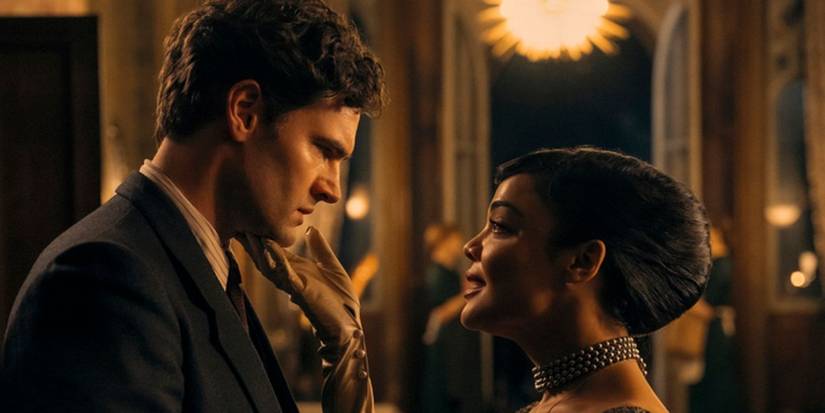The following contains spoilers for HeddaHedda is a quietly heartbreaking film, with Hedda’s actions to destroy the personal life of her former lover pushing them both to the edge. Based on the classic play Hedda Gabler by Henrik Ibsen, Tessa Thompson’s Hedda focuses on the titular high-society woman throwing a lavish party at her family estate in mid-20th-century England.
Full of quiet manipulations and sneaky betrayals, Hedda is ultimately emotionally driven by Hedda’s love/hate relationship with her former lover, Eileen. As Hedda uses the party to bring down Eileen’s new relationship and professional potential, it only exposes her own vulnerabilities. It all builds to a haunting and ambiguous ending for Hedda that lingers long after the movie ends.
Why Hedda Burns Eileen’s Manuscript
At the core of Hedda’s conflict with Eileen is the latter’s manuscript, which Hedda burns out of an apparent mix of rage, opportunism, and frustration with the world at large. One of the key elements of Hedda is the way the titular woman maneuvers and manipulates the various guests who’ve come to her estate party.
At times, her motivations appear to be completely driven by frustration and anger, lashing out at her former lover by diminishing her work or insulting her new partner. At other points, Hedda seems genuinely sad that she is still not with Eileen instead of George, an agreeable but relatively meek academic. This causes her to lash out.
The most overt reason Hedda has to steal Eileen’s manuscript and burn it is to ensure that George gets the position both he and Eileen are vying for. Hedda repeatedly notes that she has become accustomed to finer aspects of life and that the newlywed couple needs the money. By destroying the manuscript, Hedda ensures her own financial future.
It also feels like the act of a spurned lover. By tricking Eileen into believing she lost her own manuscript while Hedda quietly burns the pages alone, Hedda cracks Eileen’s sturdy exterior and leaves her crushed by her own “mistake.” This finalizes the collapse of Eileen’s relationship with her writing partner/new lover, Thea, a final piece of revenge.
Even beyond those two motivations, there’s a subtextual reason Hedda lashes out at Eileen. Hedda, a woman blessed with societal privilege but cursed with dismissive peers, is treated with far less respect than Eileen. While Eileen is still insulted and judged by some of her peers, she’s the only woman able to bicker, joke, and debate with the academics.
For much of Hedda, the titular woman moves behind the scenes to cause conflict, but she constantly relies on subterfuge and lies to push away any suspicion. She can command a room’s attention, but not its respect. Eileen is looked down upon but remains a peer to their guests, whereas Hedda is too often an afterthought, prompting her actions.
This lack of proper recognition is best defined by Judge Roland Brack, an old family friend who recognizes Hedda’s wily ways but nevertheless only sees her as a prize to be won rather than a person to respect. This has left Hedda adrift, with the character beginning and ending her story contemplating suicide by walking into a lake.
The True Tragedy Of Hedda’s Schemes And Flawed Relationships
Hedda and Eileen are both tragic figures, whose sense of ego and confidence betray vulnerable women burned by love. The film never fully dives into their romance or what happened to formally splinter them apart once and for all, but the movie has a lot of fun parsing out the fallout of that collapse.
While Hedda has found a socially acceptable husband, Eileen doubts she will ever be content. This is supported by Hedda’s embrace of chaos for the sake of it, including her habit of lying to her husband’s face whenever he inquires about what she’s doing. Hedda remains her own person, even if her agency only ever drives other people to action.
By contrast, Eileen has found respectability as a member of the academic field. She may be looked down upon as a woman in a male-dominated field, but her willingness to play their games and compose herself to their standards has elevated her in their world. Neither Hedda nor Eileen seems to be genuinely happy with these developments, however.
Eileen is respected but frustrated, especially as she struggles with sobriety. Hedda is beloved but dismissed, using her ability to slip around unnoticed to complicate several relationships. They have moments of genuine happiness when they’re alone, but Eileen finds something similar with Thea, while Hedda is left bitter and vindictive.
Neither woman can be honest about their lingering feelings for the other, except in private. Even there, both of them do their best to deny any chance for a possible reconciliation, despite the temptation. In the process, both also painfully dig at the most vulnerable elements of each other and lay the groundwork for their eventual collapses.
For Eileen, that means the loss of her manuscript. This pushes her to the brink of suicide, although her eventual gunshot injury is an accident. For Hedda, there’s the implication that she must continue to play the part of the demure young woman, either in a one-sided marriage or at the behest of Judge Brack.
Both women lash out at each other throughout the film, in part because they choose the proper paths for themselves rather than risk it all by being together. In the process, a former romance has curdled into cruel insults and vicious slights, leading both women to a psychological and spiritual breaking point.
The True Meaning Behind Hedda
Hedda is a film about the petty impulses that can drive someone into the dirt on an emotional level. Despite the wealth and status of their position, the people attending Hedda’s party are quick to commit adultery, betray friends, and attack one another. Hedda uses this to her advantage, undercutting the high society imagery by forcing out their destructive impulses.
Whether Hedda’s pettiness was driven by desperation, jealousy, anger, or even just boredom, she’s allowed herself to become the embodiment of spite. It even extends to herself; Hedda’s moments of self-reflection always paint her as painfully aware of the damage she’s doing, even as she continuously doubles down on her plans.
That’s what makes part of Hedda‘s ending involving George and Thea so surprising. After Eileen’s shooting, Hedda is surprised to discover that George is doing his best to help Thea reconstruct the thesis she wrote with Eileen. Despite the risk this poses to their financial future, George is adamant about helping because it’s the right thing to do.
This is the only time that George really stands up to Hedda, choosing to help another out of pure altruism instead of self-serving vengeance. It’s also one of the true breaking points in Hedda’s resolve. Along with Judge Brack threatening to expose her, Hedda rushes away and back to the lake to potentially take her own life.
The only lingering hope for Hedda is the discovery that Eileen has woken up following her injury, suggesting she may yet survive. It’s implied that this might also give Hedda pause in her own rash actions. It’s unclear in Hedda‘s final moments, however, leaving the thorny character drama with a touch of potential hope.

Hedda
- Release Date
-
October 22, 2025
- Runtime
-
107 minutes
- Director
-
Nia DaCosta
- Writers
-
Nia DaCosta, Henrik Ibsen





